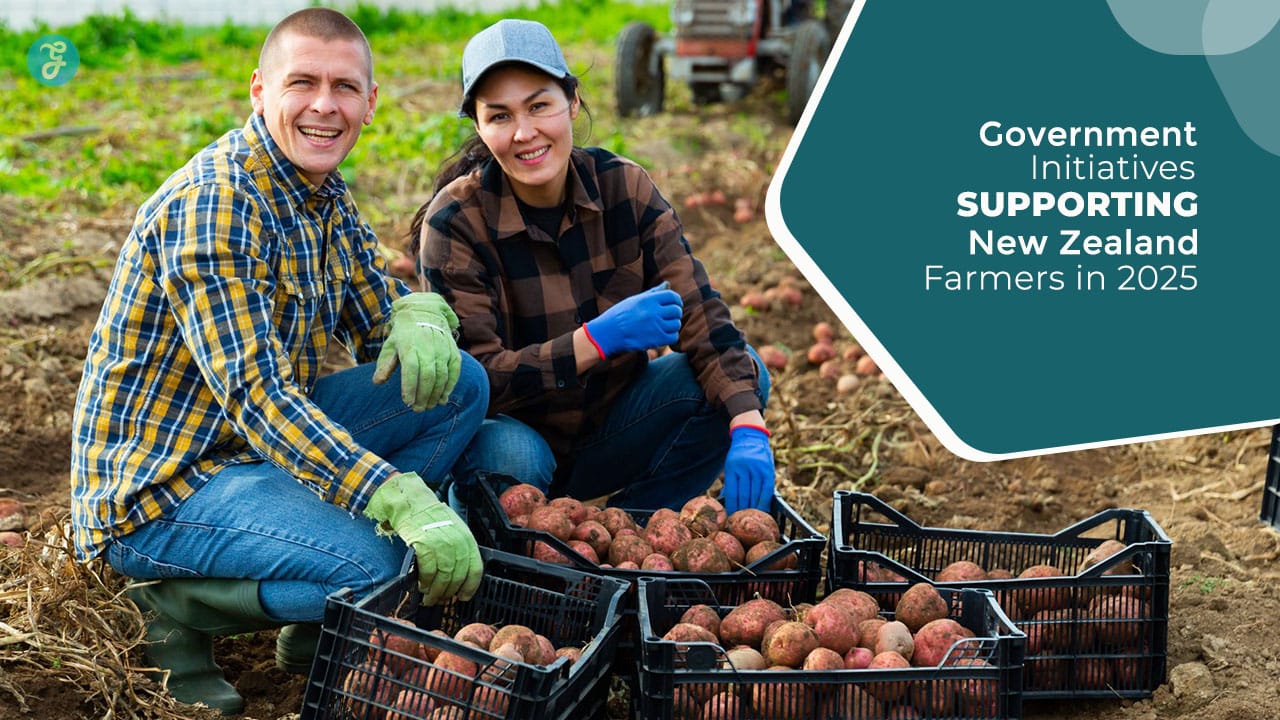New Zealand’s agricultural sector plays a critical role in the country’s economy, contributing significantly to exports and providing livelihoods to thousands of families. However, this vital sector faces growing challenges such as climate change, global competition, and the increasing need for sustainable practices. Recognizing the importance of supporting farmers, the New Zealand government has launched several initiatives to address these challenges.
In this article, we’ll explore five key government initiatives supporting New Zealand farmers, focusing on how these programs are designed to enhance sustainability, productivity, and innovation in agriculture.
Why Government Support is Essential for Farmers
Farming in New Zealand is much more than just a job—it’s a way of life that connects communities and sustains the economy. Yet, farmers face significant hurdles, including:
- Climate Change Impacts: Unpredictable weather patterns affect crop yields and livestock production.
- Rising Costs: Increasing costs for resources like fertilizers, feed, and fuel.
- Sustainability Pressures: The global push for environmentally friendly farming practices.
- Labor Shortages: Difficulty in attracting and retaining skilled agricultural workers.
Government initiatives provide vital support to farmers, helping them overcome these challenges while ensuring the sector’s growth and sustainability.
1. The Sustainable Food & Fibre Futures Fund (SFFF)
The Sustainable Food & Fibre Futures (SFFF) Fund is a government initiative that supports innovative projects aimed at improving sustainability in New Zealand’s agriculture sector. This program funds research, technology development, and initiatives that enhance environmental outcomes and market competitiveness.
Key Objectives
- Foster innovation in sustainable farming practices.
- Support projects that improve productivity while reducing environmental impacts.
- Encourage collaboration between farmers, researchers, and industry stakeholders.
Benefits for Farmers
- Funding for innovative projects and technologies.
- Improved environmental outcomes, such as reduced emissions and better water management.
- Enhanced market access for sustainable agricultural products.
How to Apply
Farmers, industry groups, and research institutions can apply for funding through the Ministry for Primary Industries (MPI). Proposals should demonstrate how they align with the program’s goals of sustainability and innovation.
Key Details of SFFF
| Feature | Details |
| Funding Scope | Up to 40% of eligible project costs |
| Eligible Participants | Farmers, industry groups, research teams |
| Focus Areas | Climate adaptation, emissions reduction |
2. The Farm Environment Plan (FEP) Initiative
Farm Environment Plans (FEPs) are a cornerstone of New Zealand’s approach to sustainable farming. These plans provide farmers with tailored strategies to manage environmental risks, improve land use practices, and meet compliance requirements.
Key Features
- Comprehensive assessment of farm operations.
- Actionable steps to improve water usage, nutrient management, and soil health.
- Compliance with local and national environmental regulations.
Benefits for Farmers
- Achieve regulatory compliance with minimal hassle.
- Protect and enhance the quality of natural resources.
- Build resilience to environmental and market pressures.
Key Components of FEPs
| Component | Description |
| Nutrient Management | Optimize fertilizer use and reduce runoff |
| Water Management | Efficient irrigation and water conservation |
| Biodiversity Protection | Enhance native flora and fauna habitats |
3. Rural Broadband Initiative (RBI)
The Rural Broadband Initiative (RBI) is designed to connect rural communities with high-speed internet, enabling farmers to access digital tools and resources. Improved connectivity empowers farmers to adopt precision agriculture techniques and engage in e-commerce.
Key Objectives
- Provide reliable broadband access to rural and remote areas.
- Enhance productivity through the use of digital tools and data-driven decision-making.
- Facilitate e-commerce opportunities for farmers.
Benefits for Farmers
- Real-time monitoring of crops and livestock through IoT devices.
- Access to online markets and global customers.
- Streamlined farm management with cloud-based tools.
Benefits of RBI for Farmers
| Benefit | Impact |
| IoT Integration | Enables smart farming technologies |
| Data-Driven Decisions | Optimizes resource allocation |
| Market Access | Expands reach through online platforms |
4. Workforce Development Programs
To address labor shortages in the agricultural sector, the government has introduced workforce development programs. These initiatives focus on training and upskilling workers to meet the demands of modern farming.
Key Features
- Specialized training in sustainable farming practices.
- Apprenticeships and career pathways for young workers.
- Programs to attract foreign labor where needed.
Benefits for Farmers
- Access to a skilled workforce capable of handling advanced technologies.
- Reduced labor shortages during critical farming seasons.
- Enhanced productivity through workforce expertise.
Workforce Development Features
| Feature | Description |
| Training Modules | Focus on sustainable and precision farming |
| Target Audience | New entrants, youth, and foreign workers |
| Funding Support | Subsidized by the government |
5. Agricultural Emissions Reduction Program
This program aims to help farmers reduce greenhouse gas emissions through the adoption of low-emission farming practices. The initiative includes funding for research, incentives for adopting sustainable technologies, and support for transitioning to renewable energy sources.
Key Objectives
- Reduce methane and carbon emissions from farming activities.
- Support the adoption of renewable energy and low-emission equipment.
- Align farming practices with global sustainability standards.
Benefits for Farmers
- Access to funding for emissions-reducing technologies.
- Improved sustainability and market competitiveness.
- Contribution to New Zealand’s climate goals.
Emissions Reduction Strategies
| Strategy | Example |
| Methane Reduction | Use of feed additives |
| Renewable Energy | Solar panels for farm operations |
| Carbon Sequestration | Planting trees and soil management |
Takeaway: Strengthening New Zealand’s Agricultural Future
The initiatives highlighted above demonstrate the New Zealand government’s commitment to supporting its farmers. By focusing on sustainability, innovation, connectivity, and workforce development, these programs equip farmers with the tools they need to succeed in a rapidly changing world.
By participating in these initiatives, New Zealand farmers can enhance their productivity, protect the environment, and secure long-term profitability. These government programs not only strengthen the agricultural sector but also ensure that it remains a vital part of the nation’s economy and culture.
If you’re a farmer in New Zealand, explore these initiatives today and take the first step towards a more sustainable and prosperous future!





































